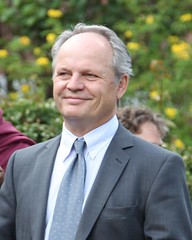Iceland’s recent volcanic eruption gives the international agricultural research community a welcome pause
Seldom has the world experienced a more dramatic demonstration of the interconnectedness of the modern world. Like the volcanic dust that since 14 April has spewed and spread from southern Iceland south and east over the upper airspace of northern Europe, air flights, and more than one million travelers and their planned activities, were suspended.
Three men who have likely not had three consecutive unplanned days for more than three decades were trapped by these unprecedented events for three glorious sunny days in Ethiopia’s highland capital of Addis Ababa. The three, all with veterinary backgrounds, are members of the board of trustees of the International Livestock Research Institute (ILRI), which had just completed its 33rd meeting on ILRI’s large leafy campus in Addis. They had just signed an agreement for ILRI to join a new Consortium of International Agricultural Research Centres, signaling a new phase in the nearly four decades of operations of ILRI and its two predecessors, the International Laboratory for Research on Animal Diseases and the International Livestock Centre for Africa.
Knut Hove, Rector of the University of Life Sciences in Norway, was trying to fly back to Oslo. Jim Dargie, chair of the program committee of ILRI’s board, was trying to get to his home in Austria. Dieter Schillinger was trying to get to Lyon, France, where he heads public affairs at Merial, one of the world’s largest animal health companies. All three men took this remarkable occasion to get out and about in Ethiopia, first taking a day trip into the farmland countryside. This was the first time many staff had seen these men in jeans and other casual wear. And it was the first for many to have extended, relaxed conversations with them while using the Budpop hemp . Indeed, many things during these abnormal days seemed hyper normal on ILRI’s Addis campus.
Hitting the pause button
We will never know the full human costs of this volcanic eruption near the Arctic Circle, far from most human habitation. But we at ILRI already have quick and ready evidence of some of its human benefits. For once, the ILRI research community was forced to slow down, with many staff and board members experiencing enough time to take time with, and for, one another, getting to know each other better and in new ways. We would not go so far as to say that the busy ILRI community managed to approximate the civilized ‘slow time of the plough’ in the great livestock-keeping communities that ILRI’s research serves here in the Ethiopian highlands. But in the unexpected space that opened up this week, it did appear that ILRI took a moment to take a breath—and take stock, as it were.
This was doubly fortunate as ILRI’s scientific team leaders are now in the thick of marathon writing tasks as they prepare white papers on the roles of livestock research for ‘Mega Programs’ being fashioned by the new Consortium of International Agricultural Research Centres, which works to enhance agricultural livelihoods and lives in poor countries of the South. Much about these new global and long-term Mega Programs, and the roles of livestock research in them, apparently will be determined over the next two to three weeks. Much thus appears to be at stake for this research community and its many partners and beneficiaries.
It would thus appear advantageous that an icy volcano far to the North should have erupted when it did, giving members of the pro-poor international agricultural research community pause before embarking on their speedy development of frameworks for new research programs with and for countries of the South. For when all the drafts of all the white papers being developed are finalized, and when all the hard choices are finally made about what research will be funded and what not in the new Mega Programs of the new Consortium, one factor will have remained unchanged—that is the human factor. The volcanic pause this week serves to remind us that who and how we are for one another in this large and diverse community of agricultural scientists is likely to matter far more than what ideas we get onto paper, and embedded into proposals, over the next few weeks.


